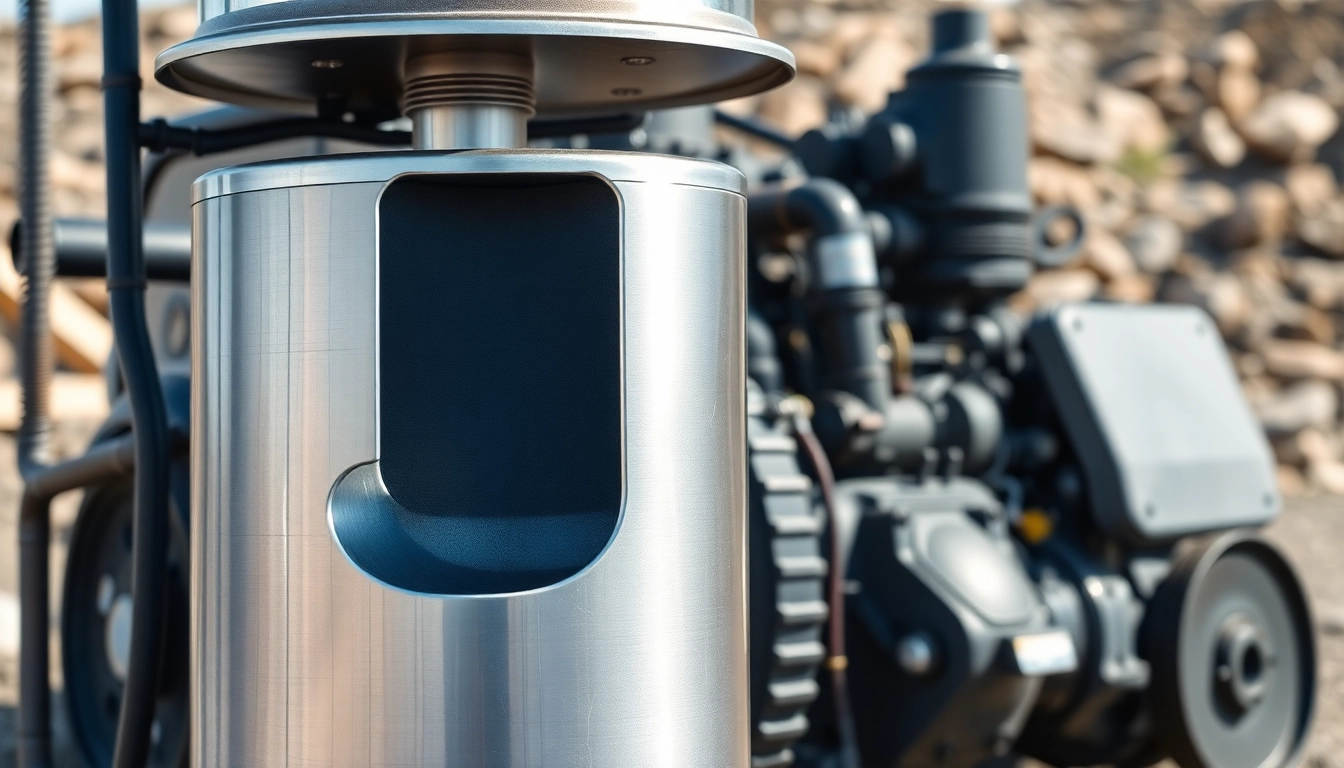Understanding Diesel Fuel Heaters
What is a Diesel Fuel Heater?
A diesel fuel heater is a specialized device designed to warm diesel fuel, particularly in cold weather conditions. This is crucial because diesel fuel can begin to gel at lower temperatures, leading to clogged fuel filters and ultimately engine failure. Beyond just preventing gelling, these heaters ensure that your engine operates efficiently by maintaining optimal fuel viscosity, thereby supporting better fuel atomization and combustion.
The diesel fuel heater plays an essential role in various applications, from automotive to industrial uses, especially in regions that experience harsh winter conditions.
How Diesel Fuel Heaters Work
Diesel fuel heaters operate using different principles based on their design, but the fundamental goal is the same: to raise the temperature of the diesel before it enters the engine. The most common types of heaters include electric in-line heaters, which are placed in the fuel line and warm the fuel as it passes through, and tank heaters that warm the diesel while it’s still in the tank.
In-line heaters work by utilizing electrical resistance to generate heat, while tank heaters often utilize heating pads or elements that circulate warm fluid around the tank. Some advanced systems may utilize engine coolant to transfer heat directly from the engine to the fuel, combining efficiency with practicality.
Benefits of Using a Diesel Fuel Heater
Using a diesel fuel heater brings a myriad of advantages, particularly in maintaining the performance and reliability of diesel engines. Key benefits include:
- Improved Cold Starts: Diesel engines require higher temperatures for optimal start-up. Heaters ensure that the fuel is warm enough to vaporize properly, reducing the effort required to start the engine in chilly environments.
- Preventing Fuel Gelling: As previously mentioned, diesel can gel in cold temperatures, blocking fuel lines and filters. Heaters prevent this by maintaining an appropriate fuel temperature.
- Enhanced Fuel Efficiency: Heating the diesel prior to combustion leads to better atomization, which allows for more efficient burns and can improve fuel efficiency in the long run.
- Extended Engine Life: Consistent, low gallon temperatures can lead to engine stress and wear. By ensuring that diesel maintains a manageable viscosity, you’re ultimately protecting your engine.
Types of Diesel Fuel Heaters
In-Line Diesel Fuel Heaters
In-line diesel fuel heaters are installed directly into the fuel line. They are designed to heat the diesel as it flows from the tank to the engine. This type of heater is characterized by its efficiency in delivering warmth directly to the engine’s input. Many modern in-line heaters come equipped with smart technology that can sense the ambient temperature and adjust their heating levels accordingly.
For instance, the Hotline Electric In-Line Fuel Heater can thaw frozen diesel fuel in mere minutes and is highly regarded for its innovation and speed.
Clamp-On Diesel Fuel Warmers
Clamp-on heaters attach directly to the fuel lines or tanks. These heaters are particularly advantageous for ease of installation and portability. They function by conducting heat through the exterior of the fuel lines or tank, effectively warming the fuel inside without any modifying or significant installation effort.
Models like the Zerostart 1500 Watt Diesel Fuel Warmer highlight their reliability and versatility, working well in a range of applications, from trucks to off-road vehicles.
Electric vs. Fluid-Based Heaters
Electric heaters use resistance heating elements to warm diesel fuel. They are typically easier to install and maintain, and they offer precise temperature control, making them a popular choice for many applications. However, they may require a higher level of electrical infrastructure, especially in heavy-duty applications.
Fluid-based heaters, on the other hand, often utilize engine coolant or other heated fluids to warm the fuel. These systems are generally more efficient, as they utilize waste heat from the engine, reducing overall energy consumption. Each type has its advantages and disadvantages; the choice depends largely on the specific needs and setup of the vehicle or equipment.
Choosing the Right Diesel Fuel Heater
Key Features to Consider
When selecting a diesel fuel heater, the following features should be considered for optimal performance:
- Heating Capacity: Ensure the heater has sufficient wattage to effectively warm the volume of diesel in your application.
- Compatibility: Check if the heater is compatible with your existing setup, including voltage requirements and mounting options.
- Safety Features: Look for heaters with built-in safety mechanisms, such as overheating protection or automatic shutdown capabilities.
- Durability: Choose units made from robust materials that can withstand environmental conditions, particularly if they will be exposed to extreme temperatures or heavy-duty usage.
- Ease of Installation: Consider whether you prefer a DIY installation or a more integrated professional installation.
Top Brands and Models
Several brands stand out in the diesel fuel heater market due to their reputation for quality and reliability. Some noteworthy mentions are:
- FASS Fuel Systems: Their Titanium Series Electric Diesel Fuel Heater Kit is designed for efficiency and includes features that prevent fuel gelling.
- Parker Racor: The Nomad 12V DC In-Line Fuel Heater is recognized for its compact design and efficient heating capabilities.
- Phillips & Temro Industries: Known for their versatile solutions, they offer a range of fuel fluid heating products, ensuring dependable engine starts in cold weather.
Price Range and Budget Planning
Diesel fuel heaters range widely in price from about $35 for basic clamp-on warmers to over $200 for advanced electric in-line systems with significant features. It’s crucial to align your budget with your specific needs and the heater’s intended use. Consider long-term savings versus short-term costs, as investing in a higher-quality unit can yield better efficiency and durability over time.
Installation and Maintenance Tips
DIY Installation Guide
Installing a diesel fuel heater can often be a straightforward process if you follow these steps:
- Read the Manual: Always begin by consulting the manufacturer’s manual for specific installation guidelines and requirements.
- Gather Necessary Tools: Collect all required tools, such as wrenches, screwdrivers, and any specific mounting hardware.
- Safety Precautions: Disconnect the battery and ensure all fuel sources are secured before beginning installation.
- Mount the Heater: Position the heater according to the manufacturer’s instructions, ensuring it is securely mounted to either the fuel tank or line.
- Connect Electrical Components: If applicable, make the necessary electrical connections, ensuring all wiring is secured and insulated to prevent shorts.
- Test the System: Once installed, reconnect the battery and test the heater in various conditions to ensure it operates as expected.
Common Issues and Troubleshooting
Despite the reliability of diesel fuel heaters, issues may arise. Common problems include:
- Heater Not Activating: Check electrical connections and fuses if the heater isn’t turning on. Ensure it’s properly wired and receiving the correct voltage.
- Inconsistent Heating: Ensure no air bubbles are in the system. These can disrupt heating and result in poor performance. Bleeding the system might be necessary.
- Overheating: If the heater overheats, ensure the installation follows manufacturer specifications. Such issues might indicate a malfunctioning thermostat or internal failure.
Maintenance Practices for Longevity
To maintain the efficiency and longevity of diesel fuel heaters, it’s advised to:
- Regularly inspect for any signs of wear or damage, especially in harsh environments.
- Clean the heating elements regularly to eliminate any build-up that might affect performance.
- Follow the manufacturer’s recommended service intervals for best results.
Real-World Applications of Diesel Fuel Heaters
Diesel Fuel Heaters in Cold Weather
Cold weather presents a unique set of challenges for diesel engines. Fuel gel can cause extensive downtime and costly repairs. Diesel fuel heaters are invaluable in these scenarios, ensuring that vehicles and machinery operate reliably even in extreme conditions. Many trucking companies and cold-weather operators rely heavily on these heaters for dependable performance.
Heaters for Automotive and Industrial Use
Beyond vehicles, diesel fuel heaters are indispensable in industrial applications. They are used in mining, agriculture, and construction, where heavy machinery must operate without fail. Utilizing such heaters in these settings minimizes downtime and maximizes operation efficiency by ensuring optimal fuel delivery irrespective of the weather.
Case Studies on Efficiency Improvements
Numerous case studies illustrate the effectiveness of diesel fuel heaters in enhancing engine performance. For example, one fleet operating in northern regions reported a 25% increase in start-up reliability and a noticeable drop in maintenance costs after incorporating in-line diesel heaters across their fleet. This highlighted the heaters’ ability not only to facilitate easier starts but also to prolong the life of critical engine components.



